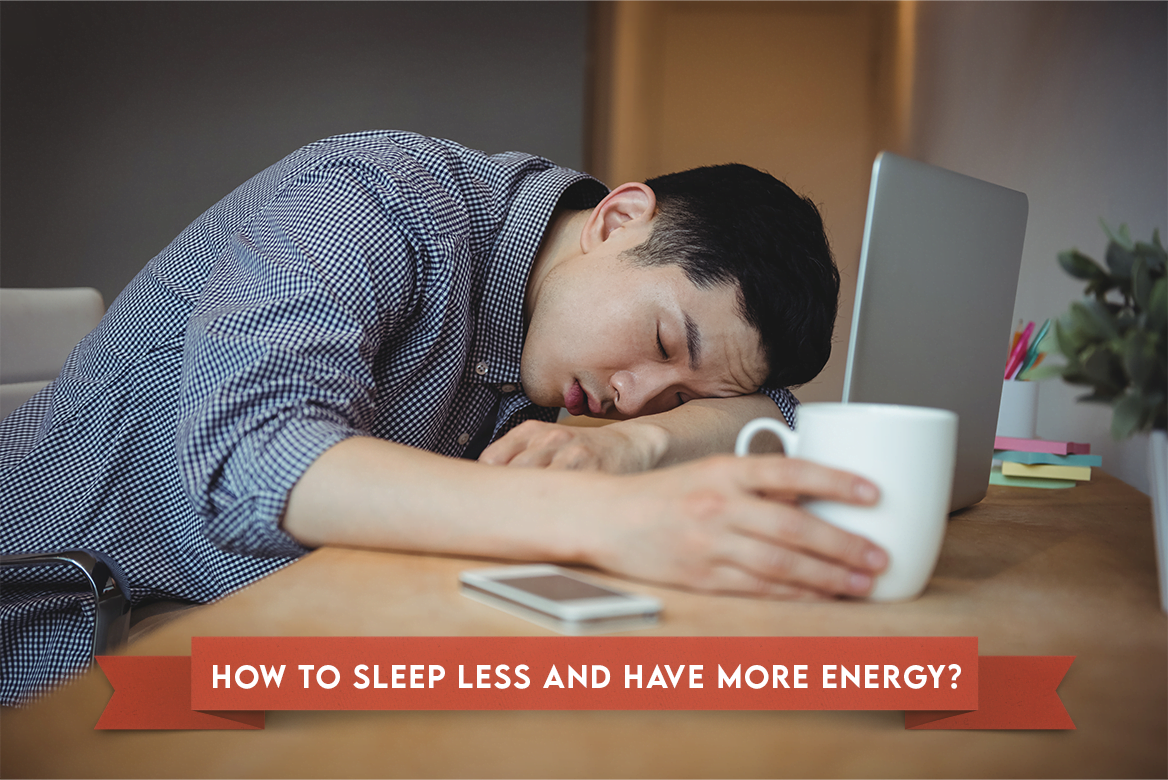Sleep plays an important role in physical and mental health, but many people are aware of proper sleeping habits. Certain people sleep too many hours, which makes them feel drowsy. Those people actually need to sleep less and then they will have more energy. Additionally, even if a person is sleeping the proper amount, there are still ways they can improve their quality of sleep. Many times people just assume if they are tired that sleeping more will help, but a person can actually sleep less and have more energy if they follow certain guidelines.

11 practical ways to Sleep Less and Have More Energy
1. Set a Bedtime
Setting a bedtime will help you have more energy each day because it will begin to train for mind and body what time it is supposed to rest. You will begin to feel tired near your set bedtime each night, and you will wake up with more energy. When a strict bedtime isn’t set, your body is never sure when it is going to get rest, so you will feel tired periodically throughout your evening or afternoon.
2. Take Power Nap
If you are feeling tired throughout the day due to an extraneous amount of work, take a power nap, but limit it to be less than 30 minutes. You will wake up feeling more refreshed if you take a short nap as opposed to a long nap due to your sleep cycle. During long periods of sleep, you enter the deep-sleep cycle. When waking up from the deep sleep cycle, you will feel less energized, and even more tired because your body was getting ready to sleep for a long time. Short naps prevent you from entering the deep sleep cycle, while also giving you energy for throughout your day. If you nap for too long, you will also have trouble falling asleep at night when you want to.
3. Limit Phone Use Before Bed
The body is designed to rest when the mind is not being stimulated visually. Laying in bed staring at social media or anything on your phone will keep you cognitively active. The bright light from your phone actually delays the onset of melatonin in your brain, which is what causes you to naturally feel tired. This will prevent your brain from preparing to rest. When you actually try to fall asleep after looking at your phone, it will take longer for your brain to begin to rest, due to the recent cognitive stimulation.
4. Hydrate Properly
Some people wake up for a short time throughout the night because they drink too many fluids before they go to bed. This disrupts their sleep cycle and causes them to need more sleep than if they didn’t get up. Other people don’t drink enough fluids before bed and they wake up because their mouth gets too dry. This will also impact your sleep quality. You will be able to sleep less and have more energy if you make sure you hydrate properly before you go to bed.
5. Gradually reduce the quantity you sleep
There is a minimum amount of sleep needed for brain function. In order to get the most out of your day, experts recommend that you get a minimum of 7 hours of sleep. Many people sleep much more than this. If you sleep more than this gradually reduce the amount you sleep in order to get the most out your day. If you try to change your sleep schedule in one big increment, you will likely not feel rested as much as if you gradually change your schedule.
6. Avoid Coffee, Drugs, and Alcohol Before Bed

Coffee has high amounts of caffeine in it, which will cause you to stay awake longer, and it will likely cause you to need to pee during the night. If you feel you need coffee drink decaffeinated coffee. Drugs and alcohol both act as toxins within the body. This means that while you sleep your body must use energy to sober up. Your sleep will feel more restful if you don’t use substances before bed.
7. Avoid Work or Stress Before Bed
Working, or thinking about something that is stressful before bed will activate your brain, and keep you up long. It is difficult to survive on little sleep unless you ensure that you get high-quality sleep. This can only be done if you are able to unwind before bed. Try reading a book or journaling before bed.
8. Sleep in Increments of 90 Minutes
This doesn’t necessarily mean that you sleep for 90 minutes, then wake up. This means that you allow yourself to 5-6 increments of 90 minutes at once. For example, 7.5 hours of sleep is exactly 5 increments of 90 minutes. This important because it will ensure that you will not be disrupting your sleep cycle when you wake up.
9. Exercise
It has been found that exercising during the day actually improves your overall sleep. Essentially, exercising will allow you to get more sleep in less time since it is better to sleep. Exercising will also help you to fall asleep faster when you go to bed. It is beneficial, but you shouldn’t exercise right before attempting to sleep. Exercising will physically stimulate the body, causing it to be more difficult to fall right asleep.
10. Don’t Consume Large Meals Before Bed

If you consume large meals before bed, your body must your energy to digest them while you sleep. It is similar to the reason that you shouldn’t consume alcohol or drugs before sleeping. Your body must use energy in order to process these items. You will not feel tired as much if you don’t eat large meals before bed.
11. Limit the amount of noise and light in your bedroom
Different noises can easily disrupt your sleep and wake you up. Waking up outside of the 90-minute increments will cause you to sleep more tired. Additionally, if you have your curtain open, the sun makes you up. If the sunrise isn’t at the same time as your alarm, it may throw off your sleep schedule and negatively impact your sleep.
Conclusion:
There are many different ways to improve your sleep and to sleep less while having more energy. Personally, I have found setting a strict sleep schedule extremely beneficial. Some of the practical ways listed may be quite beneficial to you as well. Did you enjoy this article? If so, comment below and say what tips you think are helpful. Feel free to share the article if you liked it as well.





